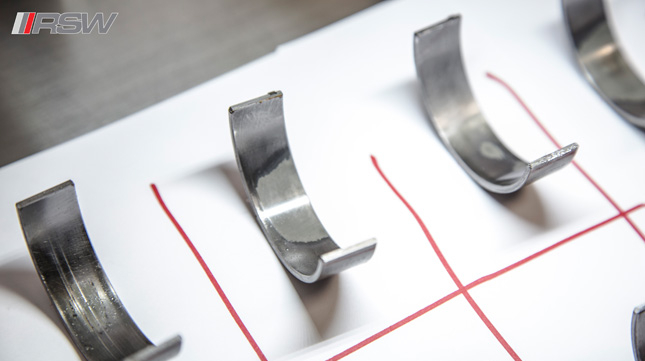
If you’re the owner of a BMW M3 or in the market to buy one, you would have seen that rod bearings are a hot topic and a common failure with this model and the S65 engine. At Prestige and Performance, we are replacing M3 rod bearings around 3 times per month. With that in mind, in this blog we explain why this happens and what can be done to prevent this issue and avoid a possible engine rebuild!
From our experience, premature rod bearing failure is the number one major failure issue for the S65 engine found in M3’s. The reason for this is that the S65 engine is designed as a sports/performance street engine as close to track ready as legally possible.
When used as designed ie. driven hard, the setup works fine with the thicker 10w-60 oil and tighter than “normal” clearance in the rod bearings. However when subjected to normal roadcar style usage the oil is never really getting up to a decent operating temperature that would allow it to flow into those tight bearings, resulting in premature wear.
This wear eventually results in your bearings either seizing up or spinning which will cause drastic damage to your engine and you will need a completely new engine or a bottom end rebuild. See https://www.m3post.com/forums/showthread.php?t=892838 for all the bearing stats. For a typical performance engine build we would normally be looking at a clearance figure of around .001” per 1” of journal diameter not the .00066” that BMW specifies for the S65.
Why This Issue Is So Common in Road-Driven M3s
The S65 engine was engineered with track-style tolerances, but most M3s spend their lives in normal road conditions. Short trips, gentle driving, and limited high-temperature operation prevent oil from flowing optimally through the tight rod bearing clearances. Over time, this mismatch between design intent and real-world use accelerates bearing wear, even in well-maintained vehicles.
Symptoms
It is important to be aware of the signs that your engine rod bearings may be starting to wear or on their way out. It is common that your car will display some or all of these signs.
- Knocking noise: you may notice a knocking noise when you start your car. This is a good sign your rod bearings may need replacing.
- Low oil pressure: You may notice decreased oil pressure when starting your car. Your “check engine oil” light will come on. Do not ignore this even if it only stays on for a few moments after first starting your car.
Recommendations
We have found rod bearings start failing around the 80,000km mark. So it’s best to get in and have them replaced well before this point and before you start hearing the symptoms as by then it may be too late. If you have purchased a car over the 80,000km mark and it has no history of having it’s rod bearings replaced we strongly recommend you book in as soon as possible.
One other tip we give which may prolong the life of your rod bearings is to use oil with a thinner viscosity. This allows it to flow into the smaller spaces more easily than a thicker oil, however it won’t prevent the inevitable if damage has already occured..

